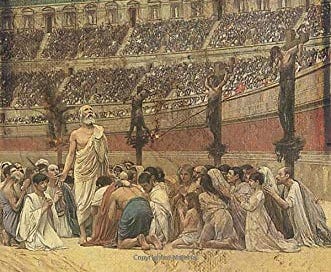If you are looking for the beginning of the study for Eusebius’ Church History then you can go HERE for a brief introduction. At the bottom of the introduction you will find the links to each section of the study guide as it becomes available. If you would like to see the growing list of book studies available for free on this site you can go HERE. Enjoy!
Virtues/Vices/Great Ideas: (Find them in the Text)
Indulgence, Prudence, Hope, Light vs. Darkness, Despotism
Grammar Questions: (The Information of the Text)
What does the word “ebionite” mean in Hebrew according to Eusebius and why is it applied to the two different cults mentioned?
What did the apostle John say and do when he realized the heretic Cerenthus was in the same bathhouse he had entered?
Which apostles did Eusebius claim were married?
What did Eusebius say was “sporadic” during the time of Emperor Trajan?
According to Eusebius, what happened after “the sacred band of apostles…passed on?”
What was Pliny the Younger’s evaluation of the Christian religion?
By the time “a certain Jew named Justus” became bishop of Jerusalem, what had happened concerning the Jewish people?
What did Ignatius request that the church of Rome not do?
Describe the church planting strategy of Quadratus and other “famed members” of the church who “built everywhere on the foundations of churches laid by the apostles.”
In what unflattering terms did Eusebius describe Papias?
Logic Questions: (Interpreting, Comparing/Contrasting, Reasoning)
What do the heresies of the Cerinthians and the Nicolaitans have in common?
Why did Eusebius make it a point to show that at least some of the apostles were married? What was his purpose in demonstrating this?
What is the logical connection between the last of the apostles (and their contemporary generation) passing away and the increase in heretical teachings creeping into the church?
Why might Pliny the Younger have reported favorable things about Christians to Trajan?
Given Pliny’s favorable report, why would Trajan reduce the active persecution of Christians but not utterly forbid it?
Why would Ignatius ask the Roman Christians not to “deprive him of his longed-for hope” of being martyred?
Why is it important to the discussion of which books belong in the New Testament that Clement of Alexandria quoted the book of Hebrews?
What was it about Papias’ understanding of Scripture which made Eusebius say he “was a man of very limited intelligence?”
Rhetoric Questions: (The Analysis of Ideas in the Text)
In our present reading two different heretical groups (under the one name, “Ebionites”) denied several key doctrines of Christianity. Between the two groups they denied doctrines such as the virgin conception of Jesus by the Holy Spirit’s power and also the preexistence of Christ. Taking these doctrines one at a time, why do they matter and what is at stake if they are rejected? Are these doctrines that can be set aside or are they essential to Christian belief? How can the Christian believer defend the truth of these doctrines?
Theological Analysis: (Sola Scriptura)
Read the New Testament epistle of Jude (just one chapter). What kind of things does Jude warn believers to watch out for concerning false teachers? What are some characteristics of false teachers according to Jude? What does Jude encourage believers to do in order that they may stay on the right path before the Lord?



